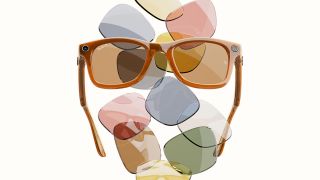We already knew Google was making at least a tentative return to the world of extended reality (XR, a catchall for VR, AR, and MR) with the announcement it’s helping to make the Samsung XR headset. But it could also be looking for another try and with one of its most high-profile flops: Google Glass.
This speculation follows an announcement from Magic Leap that it is partnering with Google to “bring Magic Leap Augmented Reality (AR) expertise and optics leadership together with Google’s technology platforms and collaborate on Extended Reality (XR) solutions and experiences.”
This is hardly a Google Glass confirmation, but it follows a few rumors that Google wants to have another crack at AR specs – including what might have been an accidental leak from its own Google I/O presentation. It also comes after Meta teased its AR glasses project, and with Apple testing the waters with the Vision Pro it would seem the entire industry is chasing an AR trend.
We are excited to be partnering with @Google. Magic Leap CEO @rossrosenberg put it best, “We are excited to announce a strategic technology partnership with Google to bring Magic Leap Augmented Reality (AR) expertise and optics leadership together with Google’s technology…May 30, 2024
Even though this partnership is seemingly set in stone we shouldn’t get our hopes up that Google Glass 2 is coming soon. LG and Meta announced plans to partner on XR technology, only for rumors to come out weeks later that they had already parted ways – rumors LG refused to dismiss.
Much like Meta and LG reportedly butted heads in several ways, Google and Magic Leap could also disagree on how best to create an AR device which could lead to their relationship breaking down.
What could a ‘Google Glass 2’ look like?
Assuming this partnership does bear fruit, what do we expect to see from Google Glass 2 – or whatever Google wants to call it?
Well design-wise we imagine it’ll look a lot more like a typical pair of specs. While Google Glass’ space-age design might have charmed some, it’s not at all subtle. The obvious camera freaked people out, and it painted a target on wearers as they were clearly wearing expensive tech that would-be thieves could rip from them. And when the battery dies, they’re useless.
Modern smart and AR glasses have some signs they’re more than meets the eye – like thicker arms, and a light that makes it clear when the camera is in use – but in general you wouldn’t know the specs were anything but regular shades unless you’re well-versed in tech. With prescription or shaded lenses, they’re also something you can wear all the time even when they run out of charge.

As for its features, obviously, AR aspects would be included. To us, this means a HUD with an overlay showing you things like directions pointing you towards your destination, and apps that have you interact with virtual objects as if they’re in the real world.
But the other big feature will most likely be AI. We’ve already seen how the Ray-Ban Meta smart glasses can leverage cameras and its AI to help you identify objects, find recipes, translate signs, and generally answer questions you might have by simply talking to your specs. Google also has a generative AI – Gemini – and while its recent attempts at AI search haven’t been the best, we’d be shocked if this tech wasn’t incorporated into Google Glass 2.
We’ll have to wait and see what Google’s next AR device has in store for us if and when it launches. You can be sure we’ll be ready to give you the lowdown as soon as we have it.